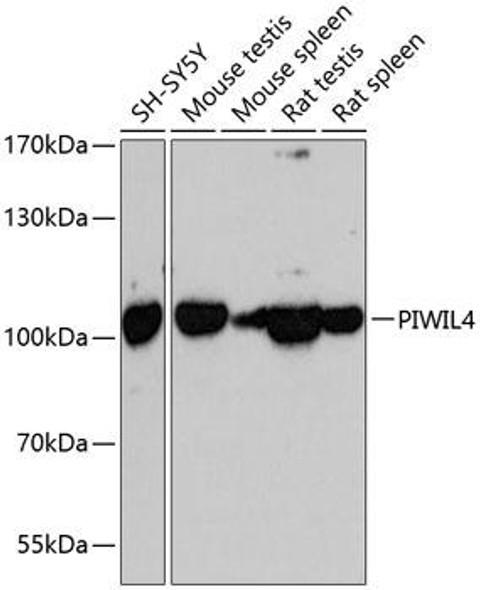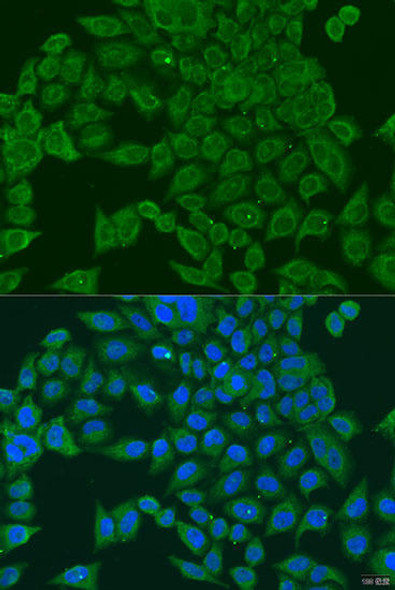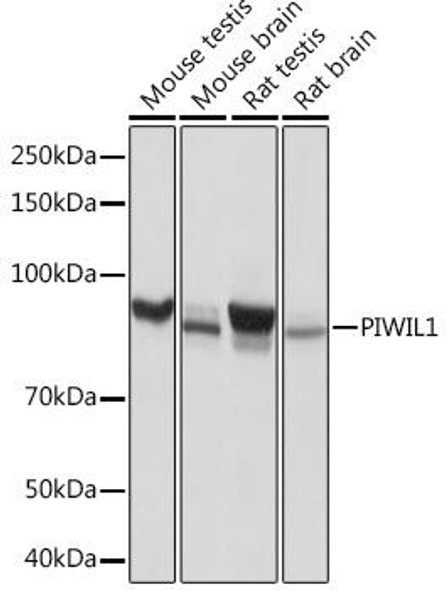Developmental Biology
Anti-PIWIL-4 Antibody (CAB3144)
- SKU:
- CAB3144
- Product Type:
- Antibody
- Reactivity:
- Human
- Reactivity:
- Rat
- Host Species:
- Rabbit
- Isotype:
- IgG
- Research Area:
- Developmental Biology
Description
| Antibody Name: | PIWIL4 Rabbit Polyclonal Antibody |
| Antibody SKU: | CAB3144 |
| Antibody Size: | 20µL, 50µL |
| Application: | WB IHC |
| Reactivity: | Human, Rat |
| Host Species: | Rabbit |
| Immunogen: | Recombinant protein of human PIWIL4 |
| Application: | WB IHC |
| Recommended Dilution: | WB 1:500 - 1:2000 IHC 1:50 - 1:200 |
| Reactivity: | Human, Rat |
| Positive Samples: | K-562, Raji, MCF7, HeLa |
| Immunogen: | Recombinant protein of human PIWIL4 |
| Purification Method: | Affinity purification |
| Storage Buffer: | Store at -20'C. Avoid freeze / thaw cycles. Buffer: PBS with 0.02% sodium azide, 50% glycerol, pH7.3. |
| Isotype: | IgG |
| Sequence: | Email for sequence |
| Gene ID: | 143689 |
| Uniprot: | Q7Z3Z4 |
| Cellular Location: | Cytoplasm, Nucleus |
| Calculated MW: | 52kDa/56kDa/96kDa |
| Observed MW: | 110kDa |
| Synonyms: | PIWIL4, HIWI2, MIWI2 |
| Background: |
| UniProt Protein Function: | PIWIL4: Plays a central role during spermatogenesis by repressing transposable elements and prevent their mobilization, which is essential for the germline integrity. Acts via the piRNA metabolic process, which mediates the repression of transposable elements during meiosis by forming complexes composed of piRNAs and Piwi proteins and govern the methylation and subsequent repression of transposons. Directly binds piRNAs, a class of 24 to 30 nucleotide RNAs that are generated by a Dicer-independent mechanism and are primarily derived from transposons and other repeated sequence elements. Associates with secondary piRNAs antisense and PIWIL2/MILI is required for such association. The piRNA process acts upstream of known mediators of DNA methylation. Participates in a piRNA amplification loop. Besides their function in transposable elements repression, piRNAs are probably involved in other processes during meiosis such as translation regulation. May be involved in the chromatin-modifying pathway by inducing 'Lys-9' methylation of histone H3 at some loci. Belongs to the argonaute family. Piwi subfamily. 3 isoforms of the human protein are produced by alternative splicing. |
| UniProt Protein Details: | Protein type:Unknown function Chromosomal Location of Human Ortholog: 11q21 Cellular Component: cytoplasm; nucleus Biological Process: regulation of translation; meiotic cell cycle; DNA methylation during gametogenesis; multicellular organismal development; spermatogenesis; RNA-mediated gene silencing; gene expression; cell differentiation |
| NCBI Summary: | PIWIL4 belongs to the Argonaute family of proteins, which function in development and maintenance of germline stem cells (Sasaki et al., 2003 [PubMed 12906857]).[supplied by OMIM, Mar 2008] |
| UniProt Code: | Q7Z3Z4 |
| NCBI GenInfo Identifier: | 116242716 |
| NCBI Gene ID: | 143689 |
| NCBI Accession: | Q7Z3Z4.2 |
| UniProt Secondary Accession: | Q7Z3Z4,Q68CZ4, Q8N8G9, Q8N9V8, Q8NEH2, B4DEG5, |
| UniProt Related Accession: | Q7Z3Z4 |
| Molecular Weight: | 852 |
| NCBI Full Name: | Piwi-like protein 4 |
| NCBI Synonym Full Names: | piwi-like RNA-mediated gene silencing 4 |
| NCBI Official Symbol: | PIWIL4 |
| NCBI Official Synonym Symbols: | HIWI2; MIWI2 |
| NCBI Protein Information: | piwi-like protein 4; piwi-like 4 |
| UniProt Protein Name: | Piwi-like protein 4 |
| Protein Family: | Piwi-like protein |
| UniProt Gene Name: | PIWIL4 |
| UniProt Entry Name: | PIWL4_HUMAN |
View AllClose






